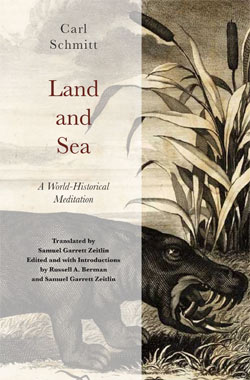Those who read Hamlet or Hecuba from the specialist’s standpoint have often found it naïve, and maybe with good reason. Yet I do not want to linger on its worth or faults as a critical essay; I would rather try to read Schmitt’s book in the same way that he read Hamlet, as an eccentric writing, not completely closed, that deals with a subject matter but revolves around another one: Hamlet or Hecuba is something more than a piece of literary criticism.
|
Political analysts have a tendency to consider political events within a relatively short time frame. This tendency has become worse over time as the study of political history has declined, and the historical memory of many analysts is often quite short. Despite this, the case for looking at the politics of a country or civilization in terms of its longue durée is quite compelling, as there can be deep structures underlying politics that are not apparent until they are investigated. Brexit provides a good example. For many people Brexit is viewed in terms of the last twenty-five years and the impact that globalization has had on Britain, as if such things have only taken place in recent times. There are deep structures in the politics of any country that shape its political culture, and hence its response to changing circumstances. Martin J. Sklar, who died in 2014, was a historian, left-wing activist, and original thinker. As a scholar/journalist-activist, he founded Studies on the Left, co-founded Socialist Revolution and In These Times, and was a founding member of The Historical Society. As a historian, he originated the influential concepts of “corporate liberalism” and “disaccumulation” and shaped the thinking of historians of the Progressive Era, the Jefferson–Hamilton divide, Lincoln’s revolutionary role in ending slavery, the sources and consequences of U.S. imperialism—and more. Telos Press Publishing is pleased to announce that Carl Schmitt’s Land and Sea: A World-Historical Meditation is now available for purchase. Order your copy today in our online store.
Translated by Samuel Garrett Zeitlin Originally published in 1942, at the height of the Second World War, Land and Sea: A World-Historical Meditation recounts Carl Schmitt’s view of world history “as a history of the battle of sea powers against land powers and of land powers against sea powers.” Schmitt here unfolds his view of world history from the Peloponnesian War to European colonial expansion to the birth pangs of capitalism, while polemically setting Nazi Germany as a continental land power against Britain and the United States as its maritime enemies. In Land and Sea, Schmitt offers his interpretations of the rise of Venice, piracy, “corsair capitalism,” the spatial revolution of European colonial expansion, the rise of the British empire, and his readings of thinkers as diverse as Seneca, Shakespeare, Herman Melville, and Benjamin Disraeli. This new and authorized edition from Telos Press Publishing, translated by Samuel Garrett Zeitlin and edited by Russell A. Berman and Samuel Garrett Zeitlin, includes extensive textual annotations that compare critical variations between the original 1942 edition of Land and Sea and the subsequent editions published in 1954 and 1981. |
||||
|
Telos Press Publishing · PO Box 811 · Candor, NY 13743 · Phone: 212-228-6479 Privacy Policy · Data Protection Copyright © 2025 Telos Press Publishing · All Rights Reserved |
||||



